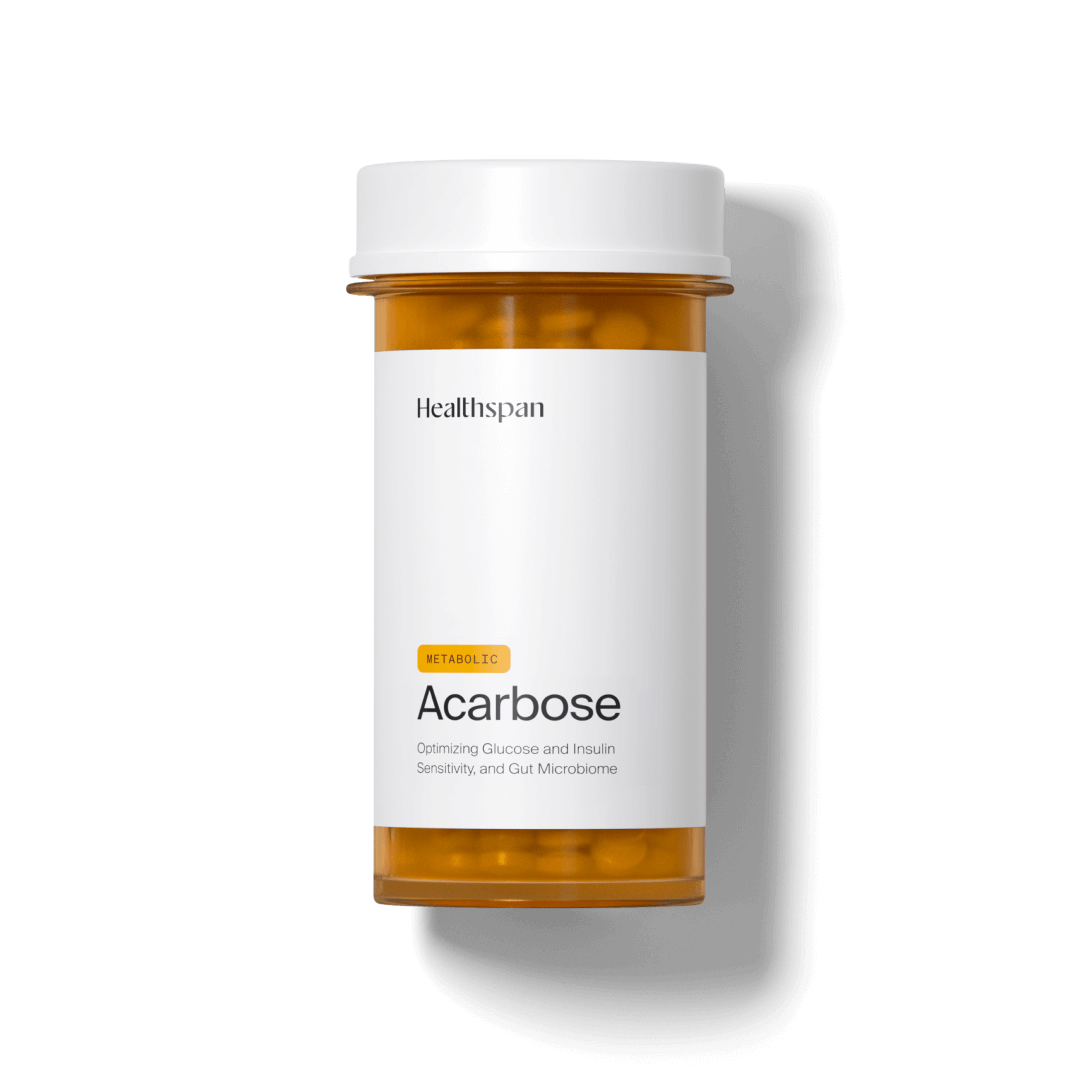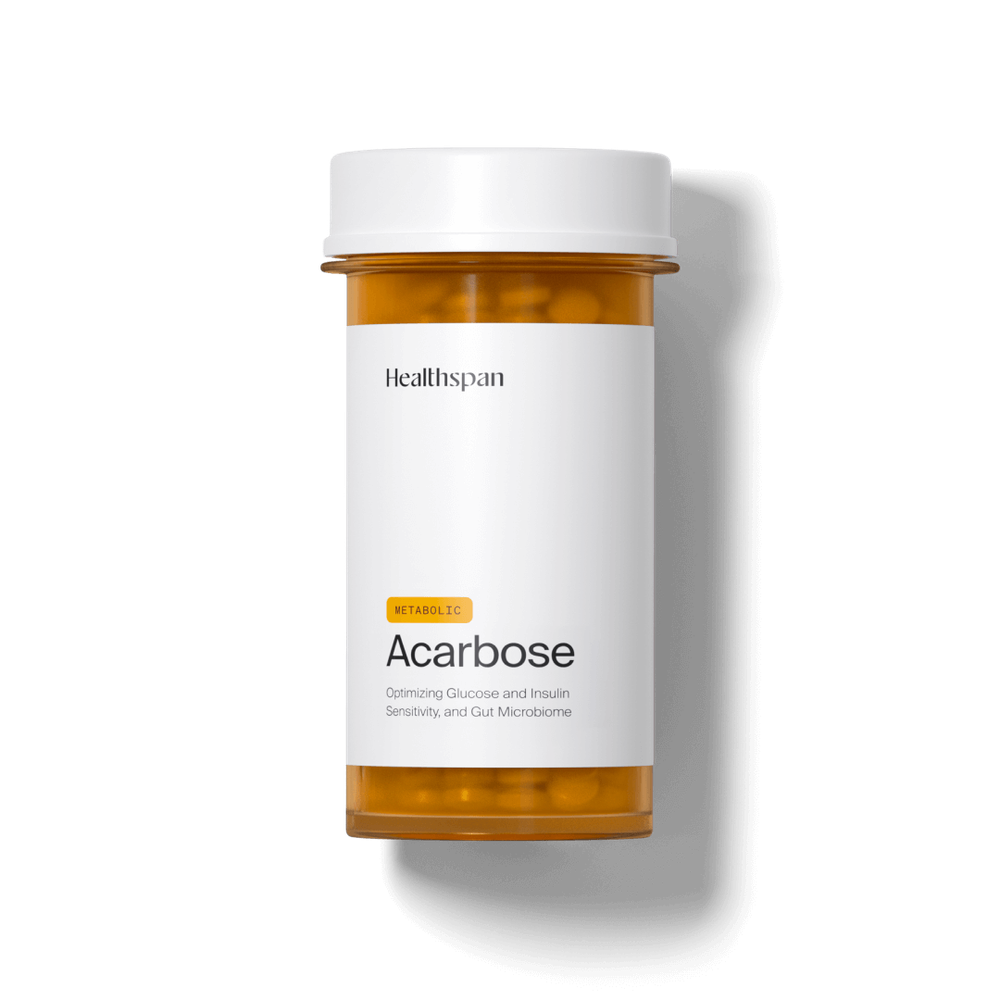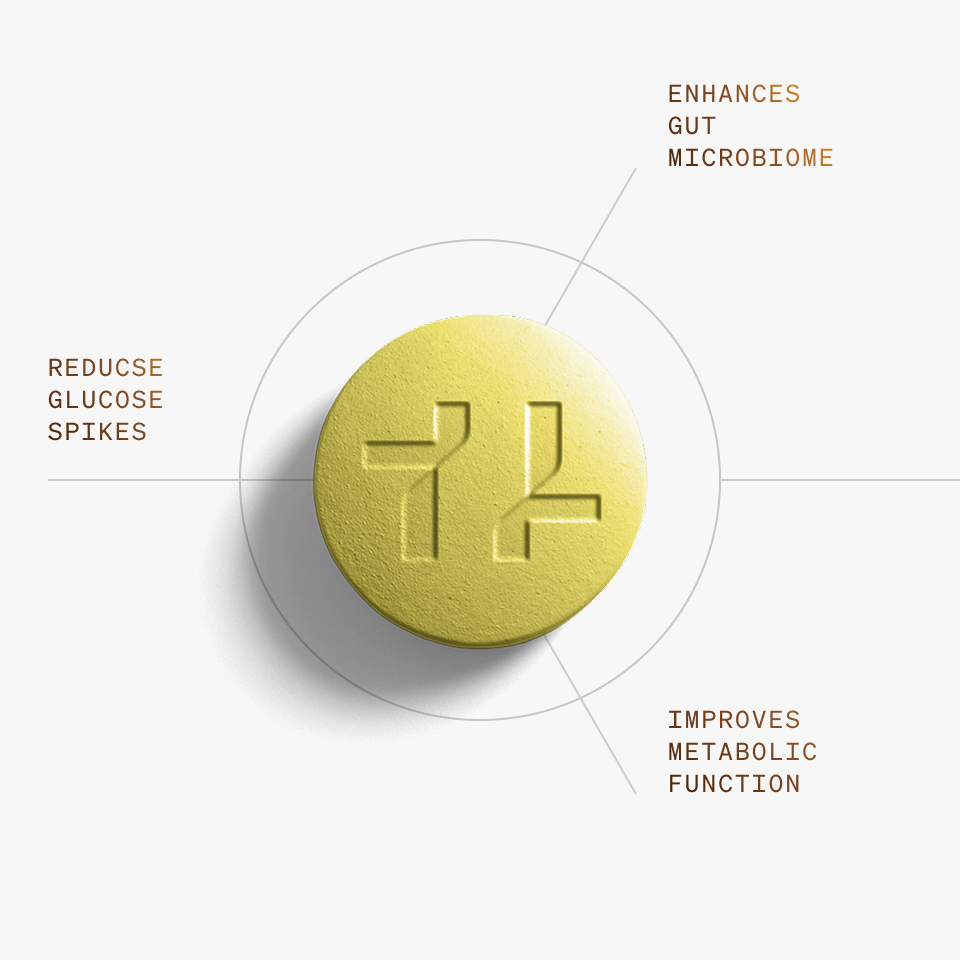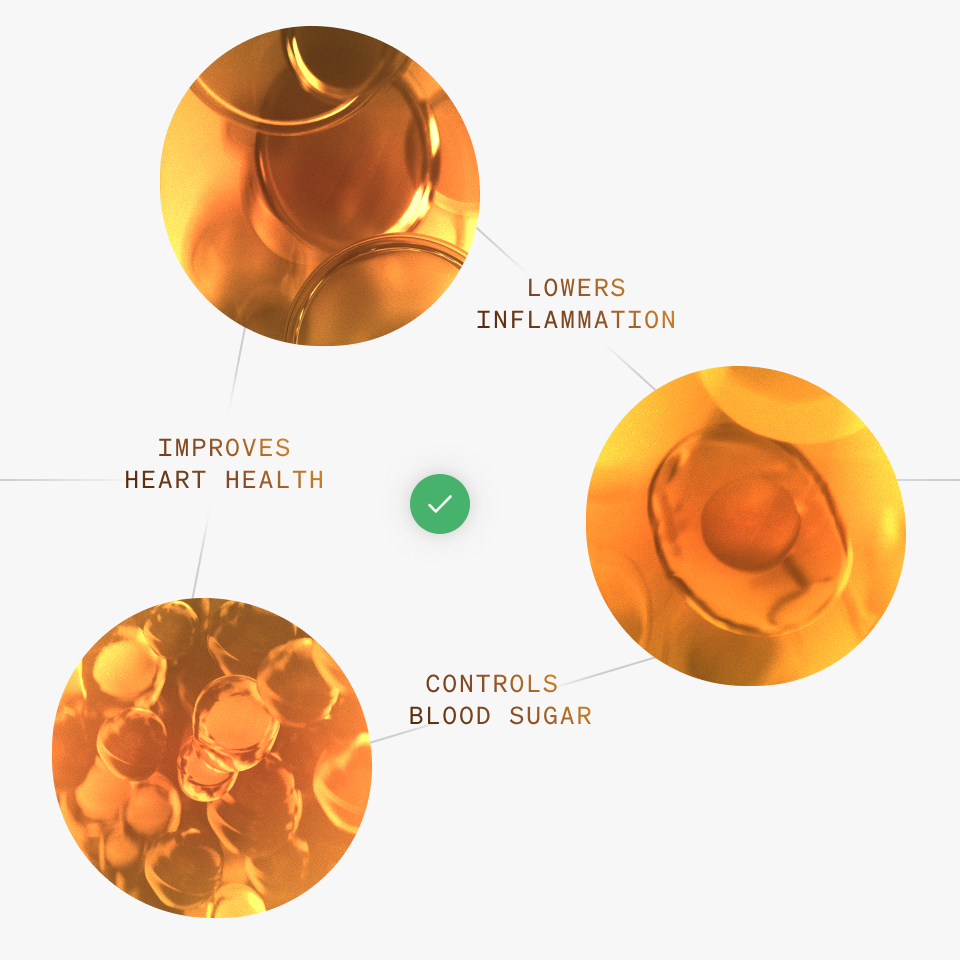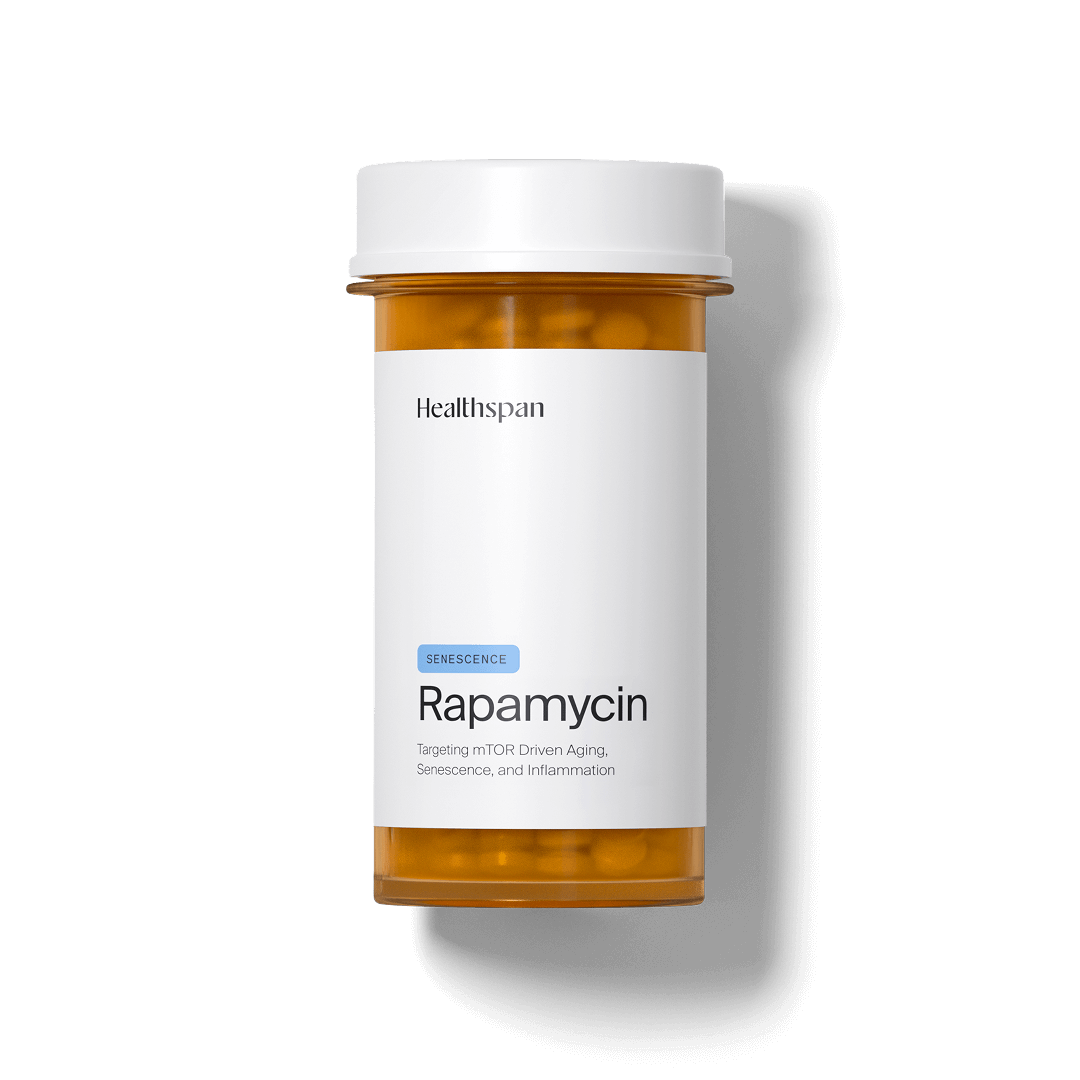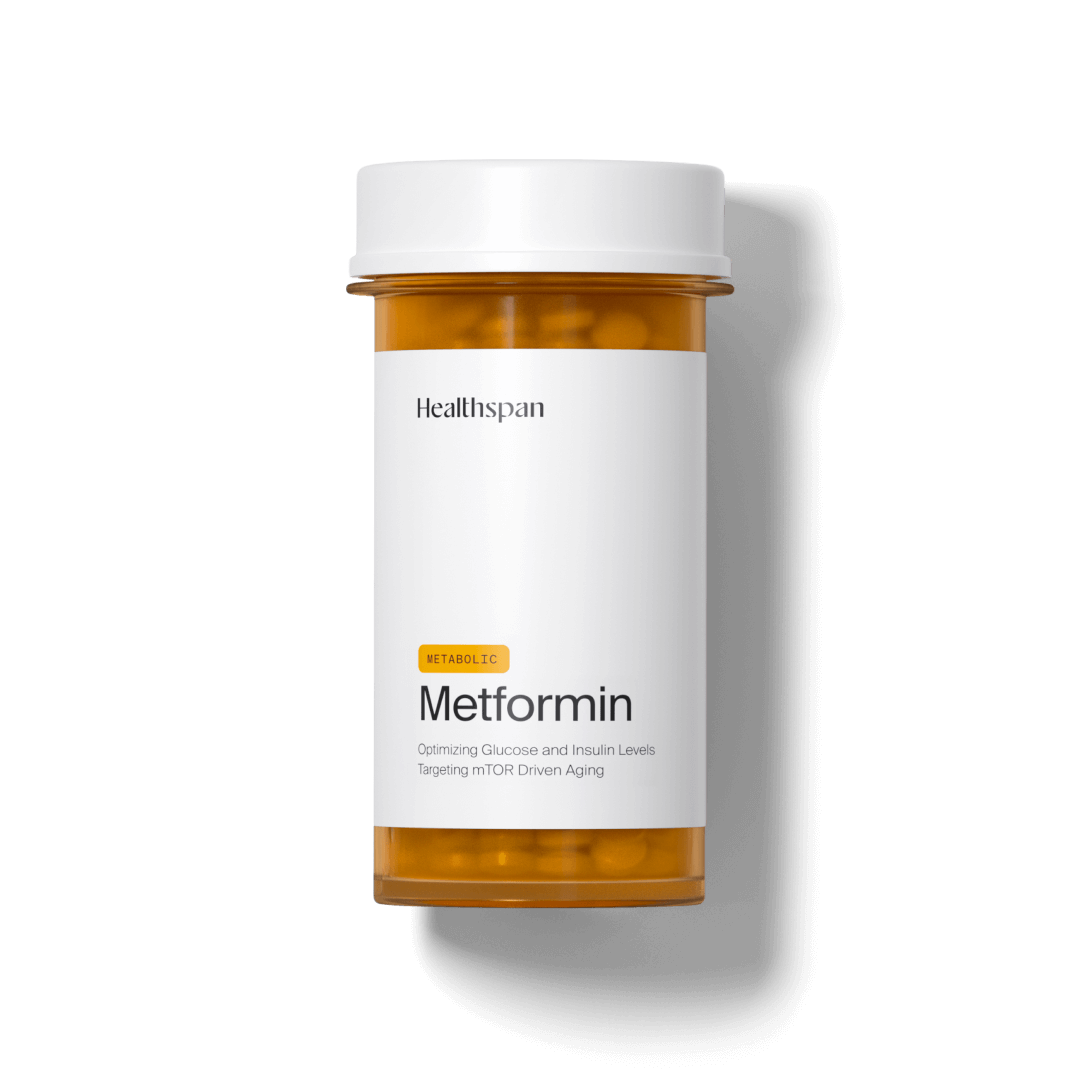My continuous glucose monitor showed a major improvement after starting acarbose. I used to spike after every meal — now my readings stay steady, and I feel more focused and energized.
Acarbose Longevity Protocol
Extensively researched for longevity, acarbose supports healthspan by flattening sugar spikes, boosting GLP-1, and strengthening gut health.
Slows carbohydrate digestion to blunt post-meal surges that fuel oxidative stress, fat storage, and accelerated aging.
Acarbose boosts natural GLP-1 production to improve insulin sensitivity and appetite control while supporting fat loss and glucose balance.
Nourishes beneficial microbes and short-chain fatty acids to lower inflammation and protect cardiovascular resilience.
Doctor prescribed. Dispensed by a LegitScript-certified pharmacy. Customized for you. Get 20% off with code BF2025
Starting At
$
25
/mo


A targeted approach to better blood sugar control and healthy aging—slowing carbohydrate absorption to reduce spikes and support overall metabolic balance.
Master the science of metabolic stability

Longevity Pathways
To affect longevity, we must understand its pathways

Insulin/IGF-1 Signaling
Acarbose inhibits gut enzymes that break down carbohydrates, reducing glucose absorption and insulin secretion. This decreases insulin/IGF-1 signaling, a pathway associated with lifespan extension when moderately inhibited.

Gut Microbiome Remodeling
Acarbose increases resistant starch that feeds beneficial gut bacteria, producing short-chain fatty acids (SCFAs) linked to longevity. This remodels the microbiome to reduce inflammation and promote healthspan.

Glycemic Control
Acarbose maintains stable blood glucose by slowing carbohydrate digestion, reducing glycation damage where sugar molecules harm proteins and accelerate aging-related cellular damage.

AMPK Activation
By reducing post-meal blood sugar spikes, Acarbose maintains a metabolic state that promotes AMPK activation, supporting autophagy and other processes associated with health and longevity.

GLP-1 Secretion
Acarbose promotes GLP-1 secretion, which slows gastric emptying and stimulates insulin release. GLP-1 provides longevity benefits through improved glucose metabolism and other mechanisms.

Mitochondrial Function
Acarbose reduces postprandial glucose spikes, helping decrease chronic inflammation and potentially delaying onset of inflammation-related age-related diseases.

Weight Control
Acarbose slows digestion to help maintain healthy weight and reduce caloric intake, acting as a caloric restriction mimetic—the most reliable intervention for lifespan extension.

Insulin/IGF-1 Signaling
Acarbose inhibits gut enzymes that break down carbohydrates, reducing glucose absorption and insulin secretion. This decreases insulin/IGF-1 signaling, a pathway associated with lifespan extension when moderately inhibited.

Gut Microbiome Remodeling
Acarbose increases resistant starch that feeds beneficial gut bacteria, producing short-chain fatty acids (SCFAs) linked to longevity. This remodels the microbiome to reduce inflammation and promote healthspan.

Glycemic Control
Acarbose maintains stable blood glucose by slowing carbohydrate digestion, reducing glycation damage where sugar molecules harm proteins and accelerate aging-related cellular damage.

AMPK Activation
By reducing post-meal blood sugar spikes, Acarbose maintains a metabolic state that promotes AMPK activation, supporting autophagy and other processes associated with health and longevity.

GLP-1 Secretion
Acarbose promotes GLP-1 secretion, which slows gastric emptying and stimulates insulin release. GLP-1 provides longevity benefits through improved glucose metabolism and other mechanisms.

Mitochondrial Function
Acarbose reduces postprandial glucose spikes, helping decrease chronic inflammation and potentially delaying onset of inflammation-related age-related diseases.

Weight Control
Acarbose slows digestion to help maintain healthy weight and reduce caloric intake, acting as a caloric restriction mimetic—the most reliable intervention for lifespan extension.

Insulin/IGF-1 Signaling
Acarbose inhibits gut enzymes that break down carbohydrates, reducing glucose absorption and insulin secretion. This decreases insulin/IGF-1 signaling, a pathway associated with lifespan extension when moderately inhibited.

Gut Microbiome Remodeling
Acarbose increases resistant starch that feeds beneficial gut bacteria, producing short-chain fatty acids (SCFAs) linked to longevity. This remodels the microbiome to reduce inflammation and promote healthspan.

Glycemic Control
Acarbose maintains stable blood glucose by slowing carbohydrate digestion, reducing glycation damage where sugar molecules harm proteins and accelerate aging-related cellular damage.

AMPK Activation
By reducing post-meal blood sugar spikes, Acarbose maintains a metabolic state that promotes AMPK activation, supporting autophagy and other processes associated with health and longevity.

GLP-1 Secretion
Acarbose promotes GLP-1 secretion, which slows gastric emptying and stimulates insulin release. GLP-1 provides longevity benefits through improved glucose metabolism and other mechanisms.

Mitochondrial Function
Acarbose reduces postprandial glucose spikes, helping decrease chronic inflammation and potentially delaying onset of inflammation-related age-related diseases.

Weight Control
Acarbose slows digestion to help maintain healthy weight and reduce caloric intake, acting as a caloric restriction mimetic—the most reliable intervention for lifespan extension.

Insulin/IGF-1 Signaling
Acarbose inhibits gut enzymes that break down carbohydrates, reducing glucose absorption and insulin secretion. This decreases insulin/IGF-1 signaling, a pathway associated with lifespan extension when moderately inhibited.

Gut Microbiome Remodeling
Acarbose increases resistant starch that feeds beneficial gut bacteria, producing short-chain fatty acids (SCFAs) linked to longevity. This remodels the microbiome to reduce inflammation and promote healthspan.

Glycemic Control
Acarbose maintains stable blood glucose by slowing carbohydrate digestion, reducing glycation damage where sugar molecules harm proteins and accelerate aging-related cellular damage.

AMPK Activation
By reducing post-meal blood sugar spikes, Acarbose maintains a metabolic state that promotes AMPK activation, supporting autophagy and other processes associated with health and longevity.

GLP-1 Secretion
Acarbose promotes GLP-1 secretion, which slows gastric emptying and stimulates insulin release. GLP-1 provides longevity benefits through improved glucose metabolism and other mechanisms.

Mitochondrial Function
Acarbose reduces postprandial glucose spikes, helping decrease chronic inflammation and potentially delaying onset of inflammation-related age-related diseases.

Weight Control
Acarbose slows digestion to help maintain healthy weight and reduce caloric intake, acting as a caloric restriction mimetic—the most reliable intervention for lifespan extension.
Hear from our patients
Reviews
238 reviews
Frequently asked questions
Acarbose is an alpha-glucosidase inhibitor that slows carbohydrate absorption, reducing post-meal glucose and insulin spikes—key drivers of aging and metabolic dysfunction.
Take with the first bite of a carb-rich meal. Tablets can be swallowed or chewed. Your clinician will guide specific timing and dose.
By stabilizing glucose, enhancing GLP-1, remodeling the microbiome, and reducing inflammation, Acarbose mimics calorie restriction—a known longevity pathway.
Yes. Acarbose moderates glucose spikes and reduces cravings, supporting better appetite control and weight regulation over time.
Temporary GI symptoms like bloating, gas, or mild cramping. These often improve with continued use and proper dose titration.
Yes. Acarbose is most effective when taken before meals containing complex carbohydrates.
Yes. Acarbose is often used off-label in longevity protocols to improve metabolic and gut health, even in non-diabetics.
Yes. Acarbose works well alongside Metformin, SGLT2 inhibitors, and Rapamycin under clinical supervision.
Acarbose is an alpha-glucosidase inhibitor that slows carbohydrate absorption, reducing post-meal glucose and insulin spikes—key drivers of aging and metabolic dysfunction.
Take with the first bite of a carb-rich meal. Tablets can be swallowed or chewed. Your clinician will guide specific timing and dose.
By stabilizing glucose, enhancing GLP-1, remodeling the microbiome, and reducing inflammation, Acarbose mimics calorie restriction—a known longevity pathway.
Yes. Acarbose moderates glucose spikes and reduces cravings, supporting better appetite control and weight regulation over time.
Temporary GI symptoms like bloating, gas, or mild cramping. These often improve with continued use and proper dose titration.
Yes. Acarbose is most effective when taken before meals containing complex carbohydrates.
Yes. Acarbose is often used off-label in longevity protocols to improve metabolic and gut health, even in non-diabetics.
Yes. Acarbose works well alongside Metformin, SGLT2 inhibitors, and Rapamycin under clinical supervision.
